
Quantitative Science Studies
Scope & Guideline
Advancing the Frontiers of Quantitative Research
Introduction
Aims and Scopes
- Bibliometrics and Scientometrics:
The journal emphasizes the quantitative analysis of scientific literature and research outputs, employing bibliometric and scientometric methods to assess research impact, citation patterns, and the development of scientific fields. - Open Science and Research Transparency:
There is a strong focus on the principles of open science, including open access publishing, data sharing, and the transparency of research processes. This includes discussions on the implications of these practices for academic integrity and accessibility. - Interdisciplinary Research Dynamics:
The journal explores the interplay between various disciplines, highlighting the motivations, challenges, and impacts of interdisciplinary collaborations on research outcomes and societal benefits. - Policy and Governance in Science:
Research related to science policy, governance, and the influence of scientific research on public policy is a key area of focus, examining how scientific knowledge informs decision-making processes. - Social Dimensions of Science:
The journal investigates the sociocultural aspects of science, including gender disparities, equity in research funding, and the societal impacts of scientific advancements.
Trending and Emerging
- Altmetrics and Social Media Influence:
There is a significant increase in studies examining the impact of social media on research dissemination and citation practices, reflecting a growing interest in how public engagement with science affects academic visibility and influence. - The Role of Data in Research:
Research focusing on data management, data sharing practices, and the implications of open data has gained traction, emphasizing the importance of data transparency and reproducibility in scientific research. - Sustainability and the United Nations Sustainable Development Goals (SDGs):
The exploration of research contributions to sustainability and SDGs has become a prominent theme, highlighting the importance of aligning scientific research with global challenges and societal needs. - Machine Learning and AI in Research Evaluation:
The application of machine learning and AI techniques for analyzing scientific publications, citation behaviors, and research impact is trending, indicating a shift towards more sophisticated analytical tools in bibliometrics. - Interdisciplinary Collaboration and Innovation:
There is a growing emphasis on understanding the motivations, outcomes, and challenges of interdisciplinary research, as collaborations across disciplines become increasingly essential for addressing complex scientific problems.
Declining or Waning
- Traditional Citation Analysis:
While citation analysis remains relevant, the focus on traditional metrics such as the h-index and impact factors has decreased as researchers increasingly seek alternative metrics that reflect broader impacts and societal relevance. - Static Research Evaluation Methods:
There is a noticeable decline in interest toward static evaluation methods that do not account for the dynamic nature of scientific research and collaboration, as more studies emphasize the need for adaptable and context-sensitive approaches. - Narrowly Focused Gender Studies:
Research solely focused on gender disparities in science, while still important, has seen reduced frequency. Scholars are now more inclined to address gender issues within broader discussions of equity and diversity in science.
Similar Journals

Annals of Library and Information Studies
Advancing Knowledge in Library and Information SciencesAnnals of Library and Information Studies is a prominent open-access journal, published by NATL INST SCIENCE COMMUNICATION-NISCAIR in India, dedicated to advancing research in the fields of library science and information studies. With an ISSN of 0972-5423 and an E-ISSN of 0975-2404, this journal ensures broad accessibility, having embraced open access since 2009, facilitating the dissemination of knowledge to a diverse global audience. The journal features a comprehensive range of scholarly articles that explore innovative practices, emerging technologies, and significant trends influencing library and information science, which are crucial for professionals, researchers, and students alike. Additionally, it holds a respectable ranking in Scopus, positioned at the 54th percentile in Library and Information Sciences and 22nd percentile in Computer Science Applications, underscoring its relevance and impact within these disciplines. The Converged Years of 2011 to 2024 illustrate a commitment to publishing contemporary research. As the realm of information continues to evolve rapidly, the Annals of Library and Information Studies serves as an essential platform for fostering dialogue and knowledge exchange, solidifying its role as a vital resource for the academic community.

Trakya University Journal of Natural Sciences
Fostering Global Collaboration in ScienceTrakya University Journal of Natural Sciences is a premier open-access journal dedicated to the dissemination of groundbreaking research in the natural sciences. Published by Trakya University, the journal has been serving the academic community since 2000, making vital contributions to fields such as biology, chemistry, physics, and environmental sciences. With an emphasis on original research, reviews, and methodological advancements, this journal aims to facilitate knowledge sharing among researchers, professionals, and students alike. Positioned to engage a global audience, the journal underscores the importance of interdisciplinary studies and strives to promote sustainable scientific practices. Its E-ISSN: 2528-9691 allows for seamless access to its articles, ensuring that all published content is readily available to the scientific community, thus enhancing its impact in the field.

Journal of Scientometric Research
Connecting researchers to the forefront of scientometric discovery.The Journal of Scientometric Research is a pivotal publication in the fields of Computer Science Applications, Information Systems, and Library and Information Sciences, published by PHCOG NET. This journal, with ISSN 2321-6654 and E-ISSN 2320-0057, serves as a vital platform for scholars and practitioners seeking to disseminate and engage with cutting-edge research from 2019 through 2024. It occupies a noteworthy position with its 2023 category quartiles, reflecting its growing influence—ranking in Q3 for Computer Science Applications and Information Systems, and Q2 in Library and Information Sciences. The journal's Scopus rankings further emphasize its relevance, performing particularly well within the social sciences domain. Researchers, professionals, and students are encouraged to take advantage of this open-access journal, contributing to the advancement of knowledge and collaboration within the diverse intersection of these fields.
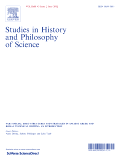
STUDIES IN HISTORY AND PHILOSOPHY OF SCIENCE
Charting the Philosophical Landscape of Scientific ProgressSTUDIES IN HISTORY AND PHILOSOPHY OF SCIENCE, published by Elsevier Science Ltd, is a leading academic journal dedicated to the exploration of historical and philosophical dimensions of science. With both an ISSN of 0039-3681 and E-ISSN of 1879-2510, this esteemed journal has established itself as a pivotal resource since its inception in 1970 and continues to publish cutting-edge research reflecting the evolution of scientific thought. Situated in the United Kingdom, it is recognized for its high-impact contributions, boasting a Q1 ranking in both History and History and Philosophy of Science categories as of 2023. Researchers in the humanities will benefit from the journal’s rigorous analysis and insightful discussions, as evidenced by its competitive Scopus rankings—placing it in the 96th and 83rd percentiles in their respective fields. Although not an open-access journal, it maintains a commitment to scholarly excellence, aiming to foster a deeper understanding of the interconnections between historical context and philosophical inquiry in the scientific domain, making it an invaluable resource for students, professionals, and researchers alike.
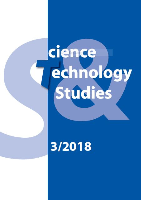
Science and Technology Studies
Advancing Knowledge Through Open Access ResearchScience and Technology Studies, an esteemed journal published by the Finnish Society for Social Science & Technology Studies, is a leading platform in the fields of History and Philosophy of Science, as well as Multidisciplinary studies. Since transitioning to an Open Access model in 2012, the journal has been committed to disseminating high-quality research accessible to a global audience, fostering international discourse and collaboration. With an impressive Scopus ranking placing it in the top 10th percentile (Rank #22 out of 223) within its categories, it showcases pioneering research and critical analyses that illuminate the complex interplay between science and societal dynamics. Located in Tampere, Finland, the journal serves as an essential resource for researchers, professionals, and students alike, aiming to advance understanding and innovation in science and technology studies through interdisciplinary engagement.
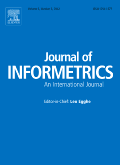
Journal of Informetrics
Fostering Interdisciplinary Dialogue in InformetricsThe Journal of Informetrics, published by Elsevier, stands as a leading platform for interdisciplinary research in the realms of Applied Mathematics, Computer Science Applications, Library and Information Sciences, Management Science, Operations Research, Modeling and Simulation, and Statistics. Boasting an impressive 2023 impact factor that ranks it in the Q1 category across multiple disciplines, the journal features a robust Scopus ranking of 38/280 in Library and Information Sciences, placing it in the 86th percentile. This esteemed journal, headquartered in the Netherlands, operates without open access, ensuring a curated selection of high-impact research. Since its inception in 2007, the Journal of Informetrics has been pivotal in advancing knowledge and fostering academic discourse, making significant contributions to the study of information metrics and analytics, thereby appealing to researchers, professionals, and students eager to stay at the forefront of this dynamic field.

Maejo International Journal of Science and Technology
Catalyzing Ideas for Global ImpactMaejo International Journal of Science and Technology, published by MAEJO University in Thailand, is a prominent open-access journal that has been disseminating scientific knowledge since 2007. With a focus on multidisciplinary research, this journal serves as a platform for scholars and innovators aiming to share their findings across diverse fields of science and technology. Despite its Q4 ranking and a Scopus percentile of 45, the journal plays a crucial role in fostering academic collaboration and enhancing accessibility to research output for global audiences. The journal's commitment to the open-access model ensures that the latest advancements are readily available to researchers, professionals, and students alike. By bridging gaps between disciplines, the Maejo International Journal of Science and Technology encourages the exploration of innovative ideas that can drive further development in various scientific endeavors.
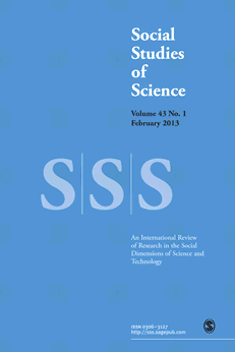
SOCIAL STUDIES OF SCIENCE
Advancing Interdisciplinary Insights into Science DynamicsThe SOCIAL STUDIES OF SCIENCE, published by SAGE PUBLICATIONS LTD, is a prestigious academic journal that has been at the forefront of interdisciplinary research since its inception in 1971. With an ISSN of 0306-3127 and an E-ISSN of 1460-3659, this journal serves as a vital platform for exploring the complex interactions between science, technology, and society. Well-recognized in the academic community, it boasts an impressive impact factor and is ranked in the Q1 quartile within major categories such as History, History and Philosophy of Science, and General Social Sciences, placing it in the top echelons of its field. Scopus rankings further emphasize its significance, notably achieving rank #9 out of 1760 in Arts and Humanities for History and a 99th percentile rank. This journal encourages Open Access for maximized outreach, although specific open access options are currently limited. The SOCIAL STUDIES OF SCIENCE is essential for researchers, professionals, and students alike, aiming to foster a deeper understanding of how scientific practices shape, and are shaped by, societal dynamics.
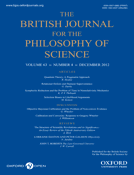
BRITISH JOURNAL FOR THE PHILOSOPHY OF SCIENCE
Elevating Academic Rigor in Philosophy of ScienceThe British Journal for the Philosophy of Science, published by University of Chicago Press, stands as a leading journal in the fields of philosophy and history of science. With its ISSN 0007-0882 and E-ISSN 1464-3537, this esteemed publication has been pivotal in advancing philosophical discussions surrounding scientific practice since its inception in 1950. Covering a diverse range of topics and critical analyses, it holds an impressive track record within the academic community, consistently achieving Q1 rankings across several categories, including History, Philosophy, and History and Philosophy of Science. With a Scopus rank placing it in the top percentiles of its respective fields, the journal is recognized not only for its academic rigor but also for its role in shaping contemporary philosophical discourse. While it is not an open-access journal, the British Journal for the Philosophy of Science provides essential insights and fosters critical thinking, making it an indispensable resource for researchers, professionals, and students dedicated to the nuanced interplay between science and philosophy.

Spontaneous Generations-Journal for the History and Philosophy of Science
Exploring the Intersection of Science, History, and PhilosophySpontaneous Generations: Journal for the History and Philosophy of Science is a dedicated publication focusing on the rich fields of history and philosophy within the scientific domain. Published by the Institute for the History and Philosophy of Science and Technology, this journal provides a vital platform for scholars, researchers, and students to explore and disseminate ideas that bridge the historical context and philosophical inquiries of scientific practices. With its commitment to open access, Spontaneous Generations ensures that groundbreaking research is widely available, fostering an environment of collaboration and knowledge sharing. Aiming to engage a diverse audience, this journal is pivotal for those looking to understand the evolution of scientific thought and its implications on contemporary issues, making it an essential resource in the academic community.